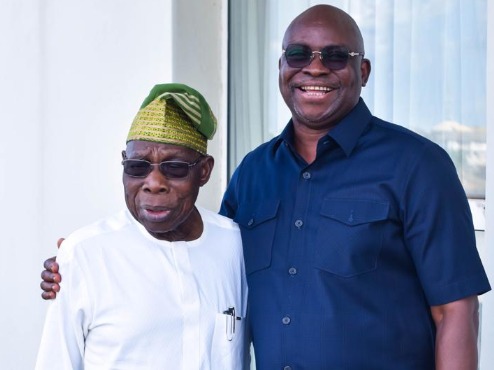Former President Olusegun Obasanjo has finally reconciled with former Ekiti State Governor Ayodele Fayose, ending a political feud that lasted more than 19 years. Obasanjo announced his decision to forgive the former governor on Saturday during Fayose’s 65th birthday celebration held in Lagos. The event was attended by political leaders, traditional rulers, and close associates of the former Ekiti governor.
In a viral video from the ceremony, Obasanjo said the occasion was not just a celebration but also a moment for reflection, maturity, and correction. He acknowledged that although he and Fayose had a difficult past, the time had come to close that chapter.
“You are not the best of my political children, but you have made achievements that must not be ignored,” Obasanjo said to the amusement of the audience. He went on to reveal that Fayose did not reach out to him directly to invite him to the event but had sent former aviation minister Osita Chidoka to act as an intermediary.
“Even to get me to come here, you could not approach me directly. You sent Osita to come and sound me out. When Osita came, I said, ‘Well, if he has sent you and you have delivered the message, then tell him that you have delivered the message.’”
Obasanjo then announced, “So, you have asked for forgiveness, and as far as I’m concerned, you are forgiven. But the right lessons must be learnt.”
The reconciliation marks the end of one of the most publicised political disagreements in Nigeria’s Fourth Republic. The strained relationship between Obasanjo and Fayose dates back to 2006, during Fayose’s first term as governor of Ekiti State under the Peoples Democratic Party (PDP).
Their fallout was intense and often played out publicly. The feud escalated after Fayose’s impeachment in 2006, a process he claimed was influenced by forces loyal to Obasanjo, who was then serving his second term as president. Over the years, both men exchanged harsh words on several occasions. Fayose often accused Obasanjo of high-handedness, while Obasanjo dismissed the former governor’s criticisms as irresponsible.
Despite being in the same political party for many years, they remained bitter political opponents. Their strained relationship continued even after Fayose returned for a second term as governor in 2014.
Saturday’s event was one of the rare public appearances in which Obasanjo addressed the long-standing hostility so openly. The former president, known for his blunt and direct style, spoke frankly about the past but also emphasised the importance of personal growth and forgiveness.
He noted that while Fayose may not have been among his most loyal political protégés, he had shown courage and resilience throughout his political career. Obasanjo also reminded him that forgiveness should come with lessons and reflection.
The public resolution of the Obasanjo-Fayose conflict carries symbolic weight in Nigerian politics. Obasanjo, a former military head of state and two-term civilian president, is widely regarded as one of Nigeria’s most influential political figures. His support—or opposition—has often shaped political careers and national conversations.
Fayose, on the other hand, is known for his outspoken nature and his willingness to confront political heavyweights. His disagreements with Obasanjo became a defining part of his political identity, especially during his second term as governor.
For nearly two decades, their quarrel reflected deeper tensions within the PDP and contributed to the fragmentation of relationships among key party figures. The public reconciliation, therefore, represents more than personal forgiveness—it is also a moment of political closure.
Ayodele Fayose first became governor of Ekiti State in 2003, winning on the platform of the PDP. His first term was turbulent, ending abruptly in 2006 after an impeachment process that generated national controversy. Despite the setback, Fayose remained active in politics and made a strong comeback in 2014 when he defeated the then-incumbent governor, Kayode Fayemi, to reclaim his seat.
Throughout his time in office, Fayose became known for his populist approach, direct communication style, and frequent clashes with political authorities. His criticisms of Obasanjo were especially biting, creating a long-standing animosity between the two.
By choosing to attend Fayose’s birthday and speak publicly about forgiveness, Obasanjo demonstrated what many have described as political maturity and statesmanship. Fayose, for his part, is believed to have made overtures toward reconciliation before the event, which eventually led to Obasanjo’s appearance.

